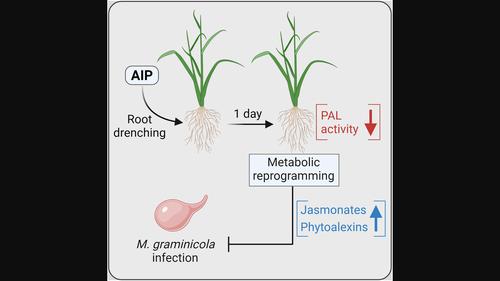当前位置:
X-MOL 学术
›
Mol. Plant Pathol.
›
论文详情
Our official English website, www.x-mol.net, welcomes your feedback! (Note: you will need to create a separate account there.)
The phenylalanine ammonia-lyase inhibitor AIP induces rice defence against the root-knot nematode Meloidogyne graminicola
Molecular Plant Pathology ( IF 4.9 ) Pub Date : 2024-01-26 , DOI: 10.1111/mpp.13424 Jing Liu 1, 2 , Hannes Lefevere 1 , Louis Coussement 3 , Ilse Delaere 4 , Tim De Meyer 3 , Kristof Demeestere 5 , Monica Höfte 4 , Jonathan Gershenzon 6 , Chhana Ullah 6 , Godelieve Gheysen 1
Molecular Plant Pathology ( IF 4.9 ) Pub Date : 2024-01-26 , DOI: 10.1111/mpp.13424 Jing Liu 1, 2 , Hannes Lefevere 1 , Louis Coussement 3 , Ilse Delaere 4 , Tim De Meyer 3 , Kristof Demeestere 5 , Monica Höfte 4 , Jonathan Gershenzon 6 , Chhana Ullah 6 , Godelieve Gheysen 1
Affiliation

|
The phenylalanine ammonia-lyase (PAL) enzyme catalyses the conversion of l-phenylalanine to trans-cinnamic acid. This conversion is the first step in phenylpropanoid biosynthesis in plants. The phenylpropanoid pathway produces diverse plant metabolites that play essential roles in various processes, including structural support and defence. Previous studies have shown that mutation of the PAL genes enhances disease susceptibility. Here, we investigated the functions of the rice PAL genes using 2-aminoindan-2-phosphonic acid (AIP), a strong competitive inhibitor of PAL enzymes. We show that the application of AIP can significantly reduce the PAL activity of rice crude protein extracts in vitro. However, when AIP was applied to intact rice plants, it reduced infection of the root-knot nematode Meloidogyne graminicola. RNA-seq showed that AIP treatment resulted in a rapid but transient upregulation of defence-related genes in roots. Moreover, targeted metabolomics demonstrated higher levels of jasmonates and antimicrobial flavonoids and diterpenoids accumulating after AIP treatment. Furthermore, chemical inhibition of the jasmonate pathway abolished the effect of AIP on nematode infection. Our results show that disturbance of the phenylpropanoid pathway by the PAL inhibitor AIP induces defence in rice against M. graminicola by activating jasmonate-mediated defence.
中文翻译:

苯丙氨酸解氨酶抑制剂 AIP 诱导水稻对根结线虫(Meloidogyne graminicola)的防御
苯丙氨酸解氨酶 (PAL) 催化L-苯丙氨酸转化为反式肉桂酸。这种转化是植物中苯丙素生物合成的第一步。苯丙素途径产生多种植物代谢物,这些代谢物在各种过程中发挥重要作用,包括结构支持和防御。先前的研究表明,PAL基因的突变会增加疾病的易感性。在这里,我们使用 2-氨基茚满-2-膦酸 (AIP)(一种 PAL 酶的强竞争性抑制剂)研究了水稻PAL基因的功能。我们表明,AIP 的应用可以显着降低体外大米粗蛋白提取物的 PAL 活性。然而,当 AIP 应用于完整的水稻植株时,它减少了根结线虫禾谷根结线虫 ( Meloidogyne graminicola)的感染。RNA-seq 显示 AIP 处理导致根中防御相关基因快速但短暂的上调。此外,靶向代谢组学表明,AIP 治疗后,茉莉酸、抗菌类黄酮和二萜类化合物的积累水平较高。此外,茉莉酸途径的化学抑制消除了 AIP 对线虫感染的影响。我们的结果表明,PAL 抑制剂 AIP 对苯丙素途径的干扰可通过激活茉莉酸介导的防御来诱导水稻对禾谷分枝杆菌的防御。
更新日期:2024-01-27
中文翻译:

苯丙氨酸解氨酶抑制剂 AIP 诱导水稻对根结线虫(Meloidogyne graminicola)的防御
苯丙氨酸解氨酶 (PAL) 催化L-苯丙氨酸转化为反式肉桂酸。这种转化是植物中苯丙素生物合成的第一步。苯丙素途径产生多种植物代谢物,这些代谢物在各种过程中发挥重要作用,包括结构支持和防御。先前的研究表明,PAL基因的突变会增加疾病的易感性。在这里,我们使用 2-氨基茚满-2-膦酸 (AIP)(一种 PAL 酶的强竞争性抑制剂)研究了水稻PAL基因的功能。我们表明,AIP 的应用可以显着降低体外大米粗蛋白提取物的 PAL 活性。然而,当 AIP 应用于完整的水稻植株时,它减少了根结线虫禾谷根结线虫 ( Meloidogyne graminicola)的感染。RNA-seq 显示 AIP 处理导致根中防御相关基因快速但短暂的上调。此外,靶向代谢组学表明,AIP 治疗后,茉莉酸、抗菌类黄酮和二萜类化合物的积累水平较高。此外,茉莉酸途径的化学抑制消除了 AIP 对线虫感染的影响。我们的结果表明,PAL 抑制剂 AIP 对苯丙素途径的干扰可通过激活茉莉酸介导的防御来诱导水稻对禾谷分枝杆菌的防御。



























 京公网安备 11010802027423号
京公网安备 11010802027423号